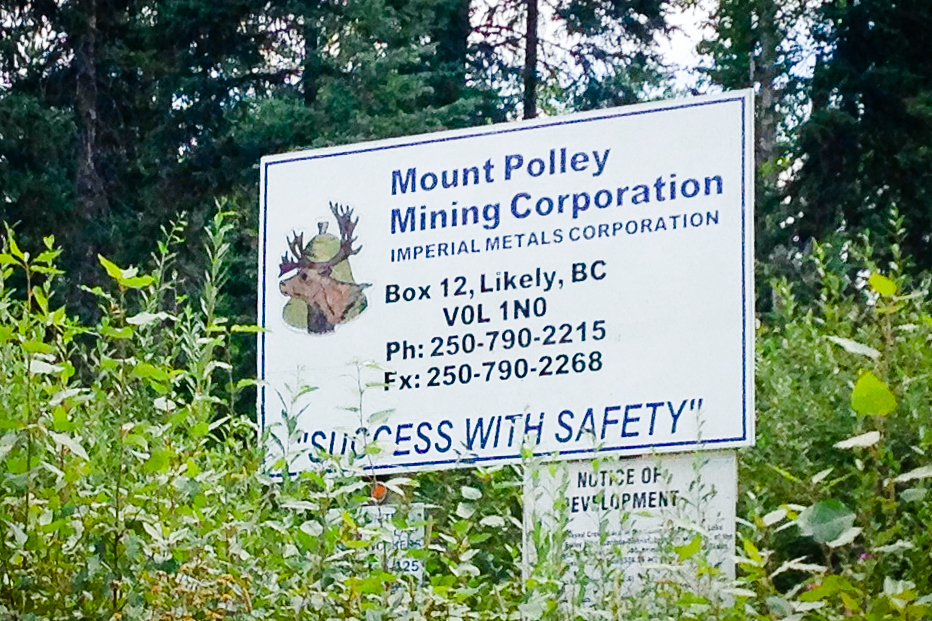Residents near the site of the burst tailings pond at the Mount Polley mine in British Columbia are becoming anxious that an investigation into the incident has yet to be completed, while the deadline to lay provincial charges looms.
“It seems to be taking a heck of a long time,” said Likely, B.C. resident Doug Watt, a retired metallurgist and environmental superintendent.
Likely is a small community on the shores of Quesnel Lake. The lake received much of the 25 million cubic metres of wastewater that surged out of the tailings pond when its embankment failed on Aug. 4, 2014.
The incident is regarded as one of the largest Canadian environmental disasters in decades.
Three years later the Conservation Officer Service (COS), leading an investigation of the incident along with federal authorities, has not completed its work.
Any charges for provincial infractions must be laid within three years of the incident, while federal infractions have a five-year deadline.
With the Aug. 4 deadline for provincial charges approaching, Watt wonders why the investigation isn’t finished.
COS deputy chief Chris Doyle told The Tyee the investigation is “complex” and that officers are meticulously going about their work.
But that doesn’t sit well with Watt.
“I’ve heard of other investigations that have certainly ended in charges in a lot shorter time period than three years,” Watt said. “This seems quite drawn out to me.”
Previous investigations wrapped up
An investigation and report by the province’s chief inspector of mines was completed in November 2015.
The report blamed aspects of mine management for the failure, including the failure to conduct a risk assessment regarding a sub-excavation of the embankment even after employees raised concerns about it.
No charges were recommended as a result of the report.
The Chief Inspector of Mine’s work was done in just over a year, and raids by the COS on corporate offices related to its investigation took place more than two and a half years ago, Watt said, so it doesn’t make sense the case hasn't concluded.
Watt won’t say if he thinks charges are appropriate until he sees the COS report, but said that many of his neighbours in Likely want the mine’s owner, Imperial Metals, charged.
Watt also said the relationship between the mining sector and the former BC Liberal government was on display when the government granted the mine permission to discharge treated mine wastewater into Quesnel Lake in April.
Imperial Metals and its owner are major donors to the BC Liberal Party.
A recent report by The Tyee delved into the relationship between the BC Liberal government and Imperial Metals through communications about the incident obtained via a freedom of information request.
The documents showed provincial communications staffers fretting about the company’s public relations and how the incident might affect proposed mines.
In one exchange not reported in the initial article, a government staffer referred to an impending meeting with Likely residents as a “lynch mob.”
‘What message does it send?’
But closure for residents isn’t the only thing hinging on the investigation’s completion.
Andrew Gage, staff counsel at West Coast Environmental Law, said a lapsed deadline with no charges could signal the province is lax on environmental enforcement.
“What message does it send to others who may be careless in their behaviour that this type of high-profile case can be dragged out so long?” Gage asked.
B.C. already has a problem investigating infractions by the mining sector, he said, because many are simply ignored by the government.
Last year, the law group released a report finding the number of tickets and convictions for environmental infractions in the mining sector had dropped significantly since 2000.
Gage said the province has disputed their figures, but has never fully explained why.
Some “soul searching” and a “major overhaul” of the province’s mine enforcement may be required to improve environmental enforcement, he said. ![]()
Read more: Rights + Justice, Environment















Tyee Commenting Guidelines
Comments that violate guidelines risk being deleted, and violations may result in a temporary or permanent user ban. Maintain the spirit of good conversation to stay in the discussion.
*Please note The Tyee is not a forum for spreading misinformation about COVID-19, denying its existence or minimizing its risk to public health.
Do:
Do not: